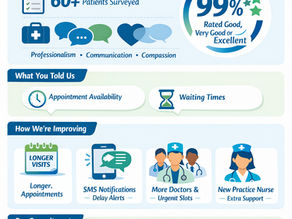top of page
Latest Practice News:


Local practice receives the mark of quality as an accredited practice
Media Release 23 January 2026 Bondi Junction increased its community health credentials today when Sapphire Family Medical Practice received a national award of accreditation, demonstrating its commitment to quality and safety within its practice. Sapphire Family Medical Practice received this important recognition from Australian General Practice Accreditation Limited (AGPAL), the leading not-for-profit provider of general practice accreditation services within Australia.


Patient Feedback Update: What You Told Us and How We’re Improving Your Care
We listened to your feedback – and we’re taking action At Sapphire Family Medical Practice, your feedback matters. In December 2025, over 60 patients shared their experiences as part of our independent CFEP Patient Feedback Survey, and we’re pleased to report that 99% of patients rated our care as good, very good or excellent, with particularly strong feedback about the professionalism, communication and compassion of our clinical and reception teams. While we’re proud of t


The Love Destination Expert Series - When It Comes To Menstruation And Period Pain, What’s Normal?
In this episode of The Love Destination Expert Series, General Practitioner Dr Dasha Fielder discusses period pain and when you should...
bottom of page
